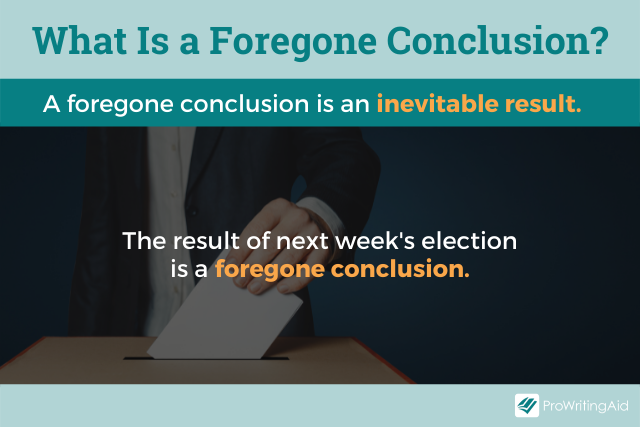
What does the word “forego” mean?
The short answer is that “forego” is a verb that can mean either “to precede” or “to do without.”
This article will explain the meaning and definition of “forego” and give you examples of how to use this word in a sentence.
Definition of Forego
According to the Collins English Dictionary, “forego” is a verb that means “to give up or do without" or “to go before in place, time, or degree.”

Meaning of Forego
Let’s take a closer look at how we use the word “forego” in real life.
Forego as a Verb: “To Go Before”
If you forego something, one possible meaning is that you precede that thing in time or place.
For example, you could say, “Your reputation for being a straight-A student foregoes you.” This means that everyone hears about your academic success before they even meet you.
Here are some other examples of this usage of “forego”:
- Whispers of the princess’s beauty forewent her in every kingdom she visited.
- The fire always foregoes the smoke.
- Some say that the Four Horsemen will forego the apocalypse.
Forego as a Verb: “To Do Without”
If you forego something, the other possible meaning is that you’ve decided to do without it, even though you would have liked to have it.
A variant spelling of this meaning is forgo with no e.
For example, you could say, “The doctor said we should forego dessert if we want to get in shape.” This sentence means that you should go without dessert in order to become healthier.
Here are some other examples of this usage of “forego”:
- I decided to forego unnecessary shopping this summer so I could save up more money.
- She had to forego her winter vacation to stay home for a family emergency.
- You may want to forego air travel to minimize your carbon footprint.
Forego in the Phrase Foregone Conclusion
The past participle of “forego” is “foregone.”
This word is often used in the phrase “foregone conclusion,” which means “an inevitable result.”

For example, you might say, “The result of next week’s election is a foregone conclusion,” which means that the election results are already decided.
Examples of Forego in a Sentence
Here are some examples of the word “forego” from successful books.
“He could not immediately forego his wild heritage and his memories of the Wild. There were days when he crept to the edge of the forest and stood and listened to something calling him far and away.”—White Fang by Jack London
“We do not know, we do not know. We shall live from day to day, and put more locks on the doors, and get a fine fierce dog when the fine fierce bitch next door has pups, and hold on to our handbags more tenaciously; and the beauty of the trees by night, and the raptures of lovers under the stars, these things we shall forego.”—Cry, the Beloved Country by Alan Paton
“How can I live without thee, how forego / Thy sweet converse, and love so dearly joined, / To live again in these wild woods forlorn?”—Paradise Lost by John Milton

“I had prepared myself to forego modern luxuries, only to find that the true sacrifice was primal needs: privacy, intimacy, comprehension, control.”—Surviving Paradise by Peter Rudiak-Gould
“Never exaggerate. It is a matter of great importance to forego superlatives, in part to avoid offending the truth, and in part to avoid cheapening your judgment.”—The Art of Worldly Wisdom by Baltasar Gracian
“It’s a problem of our time. The range of human knowledge today is so great that we’re all specialists and the distance between specializations has become so great that anyone who seeks to wander freely among them almost has to forego closeness with the people around him.”—Zen and the Art of Motorcycle Maintenance by Robert M. Pirsig
“Maybe in the end his former beliefs would be vestigial, like a foregone tail. Some little nub at the base of his philosophical spine.”—The Atlas Six by Olivie Blake

Let’s Recap: Meaning of Forego
- Forego means to do without or to go before
- Forego can also be spelt as forgo
- The past participle of forego is foregone
There you have it: the meaning of the word “forego” and all the different ways you can use it.
Was this article helpful? Let us know in the comments.
Ready to Improve Your Writing? Try ProWritingAid.


